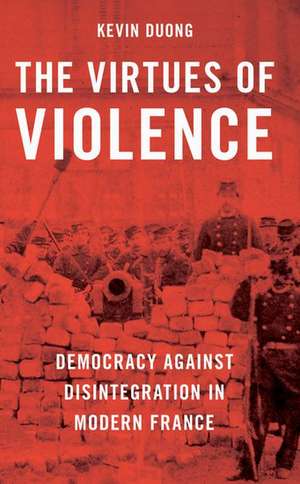The Virtues of Violence: Democracy Against Disintegration in Modern France
Autor Kevin Duongen Limba Engleză Paperback – 8 iul 2022
| Toate formatele și edițiile | Preț | Express |
|---|---|---|
| Paperback (1) | 188.66 lei 10-16 zile | |
| Oxford University Press – 8 iul 2022 | 188.66 lei 10-16 zile | |
| Hardback (1) | 352.55 lei 10-16 zile | |
| Oxford University Press – 5 iun 2020 | 352.55 lei 10-16 zile |
Preț: 188.66 lei
Preț vechi: 215.94 lei
-13% Nou
Puncte Express: 283
Preț estimativ în valută:
36.11€ • 39.24$ • 30.35£
36.11€ • 39.24$ • 30.35£
Carte disponibilă
Livrare economică 20-26 martie
Preluare comenzi: 021 569.72.76
Specificații
ISBN-13: 9780197657157
ISBN-10: 019765715X
Pagini: 256
Dimensiuni: 226 x 150 x 18 mm
Greutate: 0.36 kg
Editura: Oxford University Press
Colecția OUP USA
Locul publicării:New York, United States
ISBN-10: 019765715X
Pagini: 256
Dimensiuni: 226 x 150 x 18 mm
Greutate: 0.36 kg
Editura: Oxford University Press
Colecția OUP USA
Locul publicării:New York, United States
Recenzii
Social contract theory has tended to associate violence with chaos, disorder, and irrationality. In The Virtues of Violence, Kevin Duong directs us towards an alternative lineage of 'redemptive violence' that is inherently neither illiberal, nihilistic, nor anti-democratic ... Duong's book brims with references from across disciplines. His adroit style makes engaging with these studies a rewarding and enjoyable experience. The studies also challenge conventional wisdom ... For Duong, democracy is not simply a "set of laws or institutions," but an invitation to reimagine the social bond.
I would urge anyone interested in the complex relationship between democratic aspiration and the turn to violence to confront Kevin Duong's lucid, sharply observed, and thought-provoking book.
Duong elegantly argues his thesis through a combination of historical contextualization and close textual readings, steadfastly defending his approach against generations of moderate republicans and reformist socialists who kept denouncing the apology of political violence (even in the name of freedom, justice, and equality) as profoundly anti-democratic.
[Duong] seamlessly incorporates a wealth of historical material, textual exegesis, and conceptual argument, which makes for rewarding and pleasurable reading.
Duong is an innovative, intuitive, and insightful guide who leads us through complicated historical episodes in a compelling voice. The Virtues of Violence is an important book that will likely change the contours of debate about the meaning of nineteenth-century democratic contestation
Violence is repugnant. This book aims to make you less certain of that. Duong's surprising and original history of redemptive violence in 19th-century French political thought recaptures its relationship to a democratic desire — solidarity — that abstract rights and individual freedoms cannot satisfy. Not that we twenty-first century democrats should take to the barricades as revolutionaries, but that we must honor the demand for social cohesion and imagine non-nativist ways of satisfying it.
Kevin Duong's highly readable book deftly weaves together theory and history in an important argument about the redemptive capacity of violence. Drawing on key revolutionary moments from France, Duong's work serves as a timely corrective to those who would dismiss violence as solely destructive and divisive. Reviving conversations about violence in politics could not come at a more opportune time.
In his arresting and innovative study, Kevin Duong returns to episodes in the French republican tradition to show how violence appealed to those struggling to bring the abstractions of modern democracy into communion with the concrete social body. For historians and theorists willing to think with Duong beyond the limits of the Cold War, this book is essential.
Duong sheds light on our present with a significant and timely blend of democratic theory, political thought, and history.
I would urge anyone interested in the complex relationship between democratic aspiration and the turn to violence to confront Kevin Duong's lucid, sharply observed, and thought-provoking book.
Duong elegantly argues his thesis through a combination of historical contextualization and close textual readings, steadfastly defending his approach against generations of moderate republicans and reformist socialists who kept denouncing the apology of political violence (even in the name of freedom, justice, and equality) as profoundly anti-democratic.
[Duong] seamlessly incorporates a wealth of historical material, textual exegesis, and conceptual argument, which makes for rewarding and pleasurable reading.
Duong is an innovative, intuitive, and insightful guide who leads us through complicated historical episodes in a compelling voice. The Virtues of Violence is an important book that will likely change the contours of debate about the meaning of nineteenth-century democratic contestation
Violence is repugnant. This book aims to make you less certain of that. Duong's surprising and original history of redemptive violence in 19th-century French political thought recaptures its relationship to a democratic desire — solidarity — that abstract rights and individual freedoms cannot satisfy. Not that we twenty-first century democrats should take to the barricades as revolutionaries, but that we must honor the demand for social cohesion and imagine non-nativist ways of satisfying it.
Kevin Duong's highly readable book deftly weaves together theory and history in an important argument about the redemptive capacity of violence. Drawing on key revolutionary moments from France, Duong's work serves as a timely corrective to those who would dismiss violence as solely destructive and divisive. Reviving conversations about violence in politics could not come at a more opportune time.
In his arresting and innovative study, Kevin Duong returns to episodes in the French republican tradition to show how violence appealed to those struggling to bring the abstractions of modern democracy into communion with the concrete social body. For historians and theorists willing to think with Duong beyond the limits of the Cold War, this book is essential.
Duong sheds light on our present with a significant and timely blend of democratic theory, political thought, and history.
Notă biografică
Kevin Duong is Assistant Professor of Politics at the University of Virginia.
